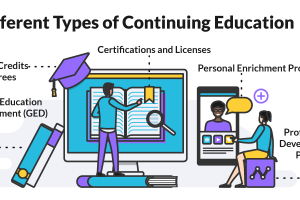Continuing education refers to any form of learning pursued after formal education is complete, whether that be high school, college, graduate school, or professional training. While no longer required, ongoing education outside of degree programs provides tremendous advantages for career and personal growth. Here we review some of the key benefits continuing education offers at any stage of life.
Career Development and Advancement
One of the prime motivations for pursuing continuing education is building skills for career advancement, remaining marketable, and avoiding professional obsolescence. Some key ways ongoing learning benefits careers include:
Developing New Skills
Degree knowledge becomes outdated as industries rapidly evolve. Continuing education offers affordable upskilling for the latest tools, technologies, and best practices to stay relevant without investing in another full degree.
Qualifying for Promotions
Further certifications, training, and credentials make professionals more qualified for higher level roles and leadership opportunities leading to promotions and pay increases.
Expanding Job Opportunities
Additional capabilities open new career directions like shifting fields, exploring emerging roles, or becoming qualified for more senior positions.
Network Expansion
Continuing education programs foster expanding professional networks and connections who can help progress careers.
Building Credentials
Many fields like project management, human resources, finance offer stackable certificates and certifications that validate specialized expertise. Earning these portable credentials grows resumes.
Avoiding Obsolescence
Lifelong learning prevents becoming outdated and less marketable as industries evolve. What was learned in college degrees likely needs ongoing enhancement through adulthood.
As business executive John F. Welch Jr. stated, “An organization’s ability to learn, and translate that learning into action rapidly, is the ultimate competitive advantage.” Continuing education helps both individuals and companies maintain this competitive edge.
Personal Development
Beyond professional motivations, many also pursue continuing education for personal enrichment and joy of lifelong learning. Key benefits for personal development include:
Discovering Passions
Continuing education allows flexibly exploring interests without the pressures of formal education. This helps uncover new vocations or avocations that enhance life.
Cognitive Health
Ongoing mental stimulation improves cognitive functions like memory, processing speed, and problem solving to maintain sharpness.
Social Connections
Learning communities foster social bonds, relationships, and support networks that improve health, wellbeing, and happiness.
Achievement and Confidence
Reaching incremental learning goals provides a sense of accomplishment. Mastering challenges builds self-efficacy.
Preparing for Retirement
Educational activities help transition to rewarding second acts and avoidance of boredom after retirement from long-held careers.
As poet Maya Angelou noted, “We must join in the evolution of our minds, bodies and spirits as long as we are alive.” Lifelong learning enables this continued personal evolution and development.
Shifting Careers
For those in career transitions, continuing education offers an affordable bridge to new opportunities. Some key advantages include:
Testing New Fields
Continuing education like community college certificates, online courses, or part-time bootcamps provide low risk ways to explore potential new fields.
Building Degree Credits
Technical school and community college programs offer credits that can transfer towards completing full bachelor’s or master’s degrees.
Developing Adjacent Skills
Upgrading adjacent capabilities allows pivoting into related careers utilizing existing experience. For example, nurses can expand into healthcare administration.
Expanding Industry Knowledge
Those changing sectors use continuing education to quickly build foundational knowledge of new industries they seek to enter.
Proving Value
Completing respected certifications demonstrates capabilities making career changers more hirable when they lack direct experience in new roles.
According to education researcher Joseph Stoper, “Continuing education is the most time and cost effective way for career changers of all ages to reskill for new opportunities.”
Improving Work Performance
Continuing education directly improves employee productivity and work quality. Some examples include:
Increased Efficiency
Learning new methods, tools, and best practices improves efficiency and allows completing more high quality work in less time.
Developing Leadership Skills
Programs in areas like communication, emotional intelligence, coaching, and management strengthen people-skills to improve leadership.
Cross-Training
Expanding skillsets allows flexing across multiple roles and filling capacity gaps that arise on teams and in organizations.
Overall Engagement
Investing in employee growth boosts motivation, morale, and loyalty according to studies by Gallup and other research firms.
As stated by ATD President Tony Bingham, “There is a direct correlation between a workforce receiving ongoing education and achieving business goals. Learning organizations perform.”
Adaptability to Change
Continuing education fosters adapting to evolving workplace and social conditions over long careers. Some examples include:
Learning New Technologies
Staying on top of digital tools and automation processes avoids displacement and obsolescence as industries undergo digital transformations.
Developing New Mindsets
Times of disruption require new ways of thinking. Continuous learning exposes professionals to modern viewpoints and methodologies.
Preparing for Role Evolutions
As responsibilities shift with the times, continual skilling ensures workers remain qualified for the redefined roles.
Leveraging Education Benefits
Many employers offer tuition reimbursement or education stipends. Taking advantage provides free upskilling.
According to CEO of Culture Amp, Didier Elzinga, “The half-life of professional skills gets shorter all the time. Constantly learning new tools, processes, and ways of thinking is critical for anyone to stay relevant in the workforce.”
Continuing education at any age provides benefits throughout life. It opens doors for those entering careers, builds expertise for established professionals, and enables late career pivots. Beyond work applications, ongoing learning offers outlets for fun and personal growth during retirement. While requiring an investment of time, pursuing regular continuing education pays dividends across all of life’s stages.


















